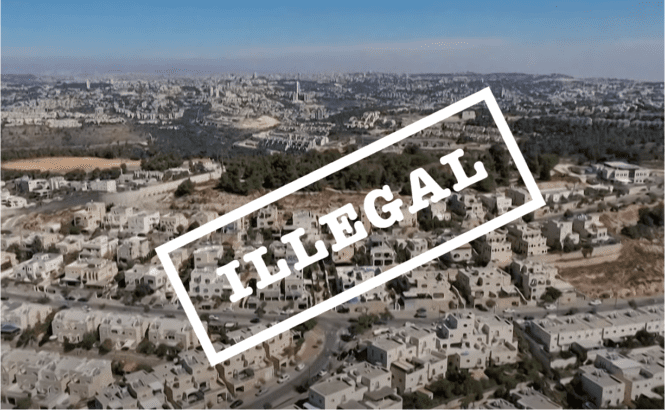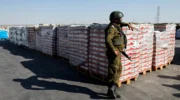q
The International Court of Justice just handed down a momentous ruling about Israeli occupation and Palestinian rights. Here are the highlights, some helpful analysis, and reactions from key players.
What just happened in The Hague?
Washington Post reports: The International Court of Justice, the top judicial arm of the United Nations, said Friday that Israel should end its occupation of Palestinian territory, evacuate existing settlements, stop building new ones and pay reparations to Palestinians who have lost land and property.
In a sweeping 83-page legal opinion, the court, based in The Hague, said Israel is responsible for “systematic discrimination” against Palestinians based on race or ethnicity, has breached the right of Palestinians to self-determination and has effectively annexed large swaths of land.
The searing advisory opinion is nonbinding but still holds legal weight and could have broader consequences in the international arena, including in trade and diplomacy. The court said member states should not recognize as legal the situation arising from Israel’s presence in occupied territory, nor should they render aid or assistance in maintaining it.
Highlights of the ruling
From Al Jazeera: Here are the landmark conclusions arrived at by 15 judges of the International Court of Justice (ICJ) on the legal consequences arising from the policies and practices of Israel in occupied Palestinian territory, including East Jerusalem:
- ICJ unanimously finds it has jurisdiction to give the advisory opinion requested.
- By 14 votes to 1, decides to comply with the request for an advisory opinion.
- By 11 votes to 4, is of the opinion that the state of Israel’s continued presence in the occupied Palestinian territory is unlawful.
- By 11 votes to 4, is of the opinion that the state of Israel is under an obligation to bring an end to its unlawful presence in occupied Palestinian territory as rapidly as possible.
- By 14 votes to 1, is of the opinion that the state of Israel is under obligation to cease immediately all new settlement activities and to evacuate all settlers from occupied Palestinian territory.
- By 14 votes to 1, is of the opinion that the state of Israel has the obligation to make reparation for damage caused to all natural and legal persons concerned in the occupied Palestinian territory.
- By 12 votes to 3, is of the opinion that all states are under obligation not to recognize as legal the situation arising from the unlawful presence of the state of Israel in occupied Palestinian territory, and not to render aid or assistance in maintaining the situation created by the continued presence of state of Israel in occupied Palestinian territory.
- By 12 votes to 3, is of the opinion that international organizations, including the United Nations, are under obligation not to recognize as legal the situation arising from the unlawful presence of the state of Israel in occupied Palestinian territory.
- By 12 votes to 3, is of the opinion that the UN, and specifically the General Assembly, which requested this opinion, and the Security Council should consider the precise modalities and further action required to bring to an end as rapidly as possible the unlawful presence of state of Israel in occupied Palestinian territory.
NOTE: Israel has illegally built around 280 settlements on Palestinian land in the occupied West Bank and East Jerusalem, which are home to more than 700,000 illegal settlers.
As the ICJ ruling confirms, Israeli settlements and settlers on Palestinian land are a violation of international law, and considered by many Palestinians to be the main barrier to any lasting peace agreement.
Some settler groups, moreover, have a history of violence against Palestinians, often with the assistance of Israeli military forces.
The ICJ ruling confirms what Palestinians have been saying for 57 years
The Intercept reports: The United Nations’ top court filed a ruling Friday that echoed what Palestinian advocates have been saying for decades: Israel’s occupation of Palestinian land, including its settlements in the West Bank, is illegal and must end.
The International Court of Justice’s advisory opinion also called for reparations for Palestinians who have lived under Israel’s occupation since it began in 1967, an unprecedented step for the court.
The court also notably declared Israel’s mistreatment of Palestinians to be a form of segregation and apartheid. It further ruled that nations cannot offer aid in support of the illegal occupation without violating international law, and upheld the Palestinians’ right to self-determination.
NOTE: The apartheid accusation has been repeated – and documented – for years. More recently, Human Rights Watch, Amnesty International, and the Israeli human rights groups B’Tselem, and Yesh Din, the United Nations (2022), the UN Economic and Social Commission for Western Asia (ESCWA) (2017), and Harvard Law School’s International Human Rights Clinic.
Advisory opinions from the ICJ are not legally binding and cannot, in themselves, force a country to act. But their legal and moral weight can have significant influence on countries’ decisions and foreign policy.
Jessica Peake, an international law professor at UCLA Law, said the ruling has the potential to shift the international community’s ability to push for Palestinian statehood. She added that the ruling exceeded her expectations, specifically around the issue of the Israeli government’s systemic abuses toward Palestinians.
“What was particularly surprising was that they basically made a finding that Israel is creating a situation of apartheid against Palestinians within Israel,” Peake said, “because of the racially discriminatory laws and policies in place that basically treat Palestinians as second-class citizens.”
The Guardian: Thorough, detailed and all encompassing, the international court of justice’s advisory ruling on the illegality of the Israeli occupation of Palestinian territory and settlement building represents a stark refutation of Israel’s claims, and will have a profound impact for years to come.
While numerous UN reports and resolutions in the general assembly have made the same point, the ICJ ruling, by virtue of being made in reference to treaty and individual laws, represents a judgment that will be hard to ignore.
In summary it said that years of Israel’s own officially and self-described ambitions to build and settle in the occupied territories amounted to an intent to effectively annex territory against international law; that those policies were designed to benefit settlers and Israel, not the Palestinians living under military administration.
Perhaps the most significant section was the judgment that “the transfer by Israel of settlers to the West Bank and Jerusalem as well as Israel’s maintenance of their presence, is contrary to article 49 of the 4th Geneva convention”.
[T]aken in its entirety, the ruling offers a profound challenge to governments, including the UK and US, that had for years soft-pedaled on Israel’s occupation policies, criticizing settlement building but until recently doing little practical about it.
The timing, too, is significant. With Israel isolated over its conduct of the Gaza war, and under investigation at the ICJ and the international criminal court for alleged war crimes, the stark assessment of the long-term illegality of Israel’s occupation will only reinforce that isolation.
Some Palestinian leaders’ reactions to the ICJ ruling:
Riyad Mansour, Palestinian ambassador to the UN: “Our people want to put an end to this occupation. What happened today is a significant step in the direction of ending occupation and attaining the inalienable rights of the Palestinian people, including their right to self determination, statehood and the right of the refugees to return.”
Mustafa Barghouti, secretary-general of the Palestinian National Initiative: “[The ruling] represents not only a historic decision, but a big blow to the Israel as a state, an establishment, a government and as settlers. It is a big victory for the Palestinian cause.
“From a legal perspective, Israel is already indicted and condemned for its policies, for its occupation, settlements, and illegal apartheid rule. The highest legal structure in the world has confirmed there is occupation and it is illegal.
“It is now the duty of everybody that respects international law to apply this resolution by demanding boycott, divestment and sanctions.”
Palestinian Presidency welcomes the ICJ ruling and called on the international community to compel Israel to rapidly end its unlawful presence in Palestine: pic.twitter.com/cwdpkLH5F2
— State of Palestine (@Palestine_UN) July 19, 2024
Some human rights orgs’ reactions to the ICJ ruling:
Amnesty Int’l: “The International Court of Justice has issued its opinion and the conclusion is loud and clear: Israel’s occupation and annexation of the Palestinian territories are unlawful, and its discriminatory laws and policies against Palestinians violate the prohibition on racial segregation and apartheid,” Erika Guevara Rosas, Amnesty International’s senior director for research, advocacy, policy and campaigns, said.
“This is a historic vindication of the rights of Palestinians who have endured decades of cruelty and systematic human rights violations stemming from Israel’s unlawful occupation.”
Human Rights Watch: “In a historic ruling, the International Court of Justice has found multiple and serious international law violations by Israel towards Palestinians in the occupied Palestinian Territory, including, for the first time, finding Israel responsible for apartheid.
“The court has placed responsibility with all states and the United Nations to end these violations of international law.
“The ruling should be yet another wake-up call for the United States to end its egregious policy of defending Israel’s oppression of Palestinians and prompt a thorough reassessment in other countries as well.”
B’Tselem: “The international community has evaded its duty to protect the Palestinians using various excuses, including the supposed temporary nature of the occupation and the claim that a diplomatic solution designed to resolve the conflict is being negotiated.
“The release of the ICJ’s advisory opinion puts an end to these justifications, and now the international community must use every tool – criminal, diplomatic and economic – to force Israeli decision-makers to end the occupation.”
Oxfam: “There must now be an end to the occupation, the dismantling of settlements, and complete self-determination for Palestinians.
“The international community cannot continue to ignore legal rulings regarding Israel’s illegal policies and inhumane practices. The UN Security Council must act now and finally put an end to the impunity that Israel has enjoyed for decades.”
Historic ruling: ICJ finds Israel guilty of apartheid against Palestinians & its military occupation & annexation of Palestinian Territory as illegal.
We for maximizing pressure on all states to impose immediate targeted sanctions on Israel inc a comprehensive #MilitaryEmbargo. pic.twitter.com/ifALJRJK0E
— BDS movement (@BDSmovement) July 19, 2024
Some world leaders’ reactions to the ICJ ruling:
A US State Department spokesperson said in an email, “We have been clear that Israel’s program of government support for settlements is both inconsistent with international law and obstructs the cause of peace…However, we are concerned that the breadth of the court’s opinion will complicate efforts to resolve the conflict.”
The State Department said it “strongly discourages” parties from using the ICJ opinion “as a pretext for further unilateral actions that deepen divisions or for supplanting a negotiated two-state solution.”
EU’s top foreign affairs minister Josep Borrell: “In a world of constant and increasing violations of international law, it is our moral duty to reaffirm our unwavering commitment to all ICJ decisions in a consistent manner, irrespective of the subject in question,” he said.
Borrell added in a statement that the opinion “will need to be analysed more thoroughly, including in view of its implications for EU policy”.
Some Israeli leaders’ reactions to the ICJ ruling:
The Israeli government immediately dismissed the ICJ ruling, with a defiant Prime Minister Netanyahu calling Jerusalem “our eternal capital” and referred to the West Bank as “the land of our ancestors,” using the biblical names “Judea and Samaria.”
“No false decision in The Hague will distort this historical truth,” he said in a statement, “and likewise the legality of Israeli settlement in all the territories of our homeland cannot be contested.”
RECOMMENDED READING: Netanyahu purveyed a fictional history of Israel to Jordan Peterson
Itamar Ben Gvir: Israeli National Security Minister Itamar Ben-Gvir has reacted to the ICJ ruling, labelling the court’s decision as “clearly anti-Semitic and political”.
“We will not accept moral preaching from the court as the time for rule and sovereignty has come,” he said, according to the Israel Hayom newspaper.
Gilad Erdan, Israel’s ambassador to the UN, says those measures could include closing the UN complex in Jerusalem and deporting UN agency heads from Israel.
Israel has previously banned UN employees and officials, including the UN’s special rapporteur for the West Bank and Gaza, Francesca Albanese.
Erdan added he has “no doubt” that the US would veto any UN Security Council resolutions introduced in the wake of the ICJ ruling, which said Israel’s settlement policies in the occupied West Bank are in breach of international law.
Israeli opposition leader Yair Lapid has criticized the opinion issued by the ICJ, saying it is “detached, one-sided, tainted with anti-Semitism and a lack of understanding of the reality on the ground”.
“It only serves Islamic terrorism and the campaign against Israel,” Lapid said on X.
Israeli Energy Minister Eli Cohen: “For 2,000 years we prayed to return there and no distorted decision of a biased and anti-Semitic court will move us an inch.”
President @Isaac_Herzog rejected outright the one-sided and ill-judged advisory opinion of the ICJ. Their words undermine the entire notion of the process of negotiations between Israel and the Palestinians. It also blatantly ignores the Jewish people’s historic connection to the… https://t.co/tt1T3Ammca
— Office of the President of Israel (@IsraelPresident) July 19, 2024
RELATED:
- Fact or Fiction: Is Israel Unfairly Singled Out for Global Condemnation?
- Synopsis of ICJ’s decision on Israeli genocide, reactions, and take-aways
- The ICJ presentations on Israeli genocide against Palestinians
- Is “Israel Has a Right to Defend Itself” Code for “We Are Killing the Geneva Conventions”?
- To continue the Gaza genocide, Israel and the US must destroy the laws of war
- Spying & threats: Israel spent 9 years trying to keep the ICC off the trail of Israel’s war crimes
- Israel, The ICC, And The Disintegration Of Our Species
- The Right of Return to Free Palestine
- War on Gaza: Why Israel deserves to be singled out for criticism





